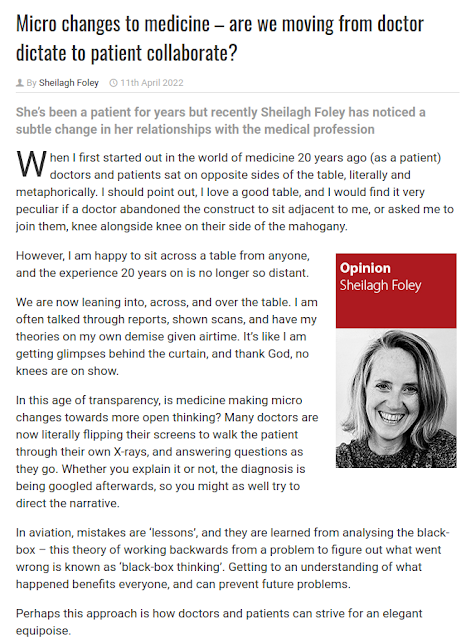The Irish Medical Times - Micro changes to medicine: are we moving from doctor dictate to patient collaborate?
Traditionally in medicine if you have an epic fail you can be struck off, not exactly a ‘teachable moment’, at least not for the doctor exiting the building. Medicine can be a high stakes environment with little margin for error. Doctors often have to tread carefully even with their language, a 'mistake' may become a 'complication', this likely stems from good intentions; an effort to euphemize rather than catastrophize the situation. Patients are often kept on a need-to-know basis, perhaps due to efficiency, to avoid unnecessary anxiety and the assumption they wouldn't quite understand. But in a world where access is in excess, patients can be highly informed (albeit rightly or wrongly). The sharing of information, the explaining, taking out the black-box (whether it is a report, xray or scan) - these are a welcomed progression.
To state the obvious - doctors need patients, and patients need doctors, our level of co-dependency would make even Big Pharma blush. Some patients can talk for hours with an almost disturbing level of detail about their condition, others know very little. Being a patient is not a role we are trained for. When you become a patient, much like becoming a parent or a teenager, no one hands you a booklet with a list of next steps; ‘what to expect when you’re not expecting it’, or ‘how to firefight while taking charge and letting go’.
Within a healthcare setting the doctors and nurses provide diligent care, but at some point, you go home…alone. A neighbour of mine once suggested to a doctor, at discharge from hospital, that she would “most certainly go home” on the proviso that the doctor himself came home with her! To the best of my knowledge, he declined.
From a patient's point of view, the doctor continuing to dispense care from their new home on your fold-out couch seems appropriate (after all, they’ve already got the pajamas). It is a fraught suggestion, of course, but so is the expectation for patients to suddenly become their own case manager. I have high praise for care in the community, also the incredible advantages to the social prescribing of patient supports, not to mention the efforts made by GPs and Outpatient clinics in taking the onus off the patient. And let’s not overlook the immense blockchain of support that family, friends and patient organisations become. However, the buck stops with the patient, whether we like it or not, ultimately we are responsible for ourselves.
After years of living abroad, with my doctors spread across countries, I tried hard to conflate my care into one hospital after I returned to Ireland. But it turns out I can’t pick or choose where people work, and as time went on it emerged the best specialists for my myriad of complaints were dotted over 2 countries. I often wonder if I brought my crack squad together, would it be like a scene from The Departed (minus the Boston accents) - “I’m the guy who does his job, you must be the other guy.” Even if this prism of practitioners (no gangsters) all happened to be ‘bestos’ and spent their spare time sharing milkshakes locked in detailed talks about my complaints, when all is said and done, I am the decision maker.
Like many of my generation I’ve lived abroad, I’ve attended hospitals whose names I can barely remember. I grew up awash with “awareness”, I get most things checked out, I’m catching cancers and failing organs left, right and centre (unfortunately). I have a medical history far reaching and more complicated than a baboon’s dating profile. And I’m the tip of the iceberg! The rising on-demand generation that has lived through a pandemic and a war, they won’t settle for a seat at the table and a voice, they want to hack the table and sing…together.
With my history I can’t afford to be passive, I can’t assume that my laundry list of cancers, late-effects and heart disease has been communicated to every doctor that stands in front of me. I have to tell my story over and over. For my visits to A&E I have to know what medications I am on and why. I wear a band so people on the street will know I have a defibrillator if/when I collapse. I ask doctors and nurses questions, I fold and unfold my thoughts, trying to understand, so the next time I’m in front of another doctor I will be able to tell my ever evolving story and answer their questions.
Patients are no longer passengers on their journey, the curtain has been pulled back, and unless the plan is for patients to be discharged home with a prescription and a doctor of their choice carrying their bags, working together is the way forward.
But then again I am not a doctor, I don’t know what life is like on the other side of the table - is there some leg room left? Or are we getting too big for our boots?


Comments
Post a Comment